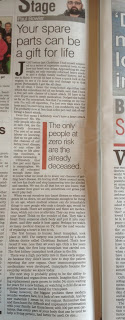My column in The Kerryman. 10 April, 2013
Just before last Christmas I had myself subjected to a series of expensive medical tests, to see how my heart was doing. Approaching 40, over weight, an only recently reformed heavy smoker and a dodgy family medical history, led to me to think it would be best to have a quick look at the engine, to see if I’d done any real damage up to that point. Fortunately I got the all clear.
By all clear, I mean the complicated algorithm into which the consultant fed all my details, said, that I have a 5% chance of a heart attack. I’d have to be over 13% to merit medication. Dodged the bullet as far as I’m concerned. Not that I’m resting on my laurels. I’m still off cigarettes, I’ve lost over 6kgs since the tests and I’m exercising more. I can confidently say, that I’m probably now at less than 5% risk of suffering a heart attack.
Does that mean I definitely won’t have a heart attack tomorrow? No. The only people who are at 0% risk, are the already deceased. The rest of us must labour on knowing, that as we get older, the chances of suffering heart disease, or any other life ending or life altering condition, is always increasing.
Ultimately that 5% figure is meaningless. We are all educated enough these days to know what we must do to lower our chances of getting heart disease. It’s boring stuff. Move around more, eat less fun foods and stop hammering into the alcohol and smokes. We can do all that but we also know, that no matter how good we are, sometimes our genes just won’t play ball.
When we eat ourselves into heart disease or when our genes let us down, we are fortunate enough to be living in an age, where medical science can do remarkable things to save people who only a decade ago, would be facing death. There are surgeries and there are medications, which can cure or alleviate. They can even replace your heart! Think on the wonder of that. They take a heart from someone else’s body and put it into your chest. And they make it beat again. Perhaps we watch so many medical dramas on TV, that the mad wonder of replacing a heart is lost to us.
The first human to human heart transplant, took place in 1967. The surgery was performed by a South African doctor, called Christiaan Barnard. That’s how recent it was. Less than 40 years ago. Only a few years before that, the first lung transplant was carried out. The first kidney transplant took place in the 50s.
There was a high mortality rate in these early surgeries because they didn’t know how to stop the patient rejecting the new organs. Once immunosuppressive medications were developed, transplants became the everyday wonder we know today.
The next step is probably going to be the ability to grow blood and organs from scratch. Imagine that. Having replacement parts grown to order. No more waiting for years for a new kidney, or watching a child die as no suitable heart can be found for transplant.
Today however, the biggest problem these modern wonder workers face, is a lack of raw materials. And by raw materials I mean us, our organs. Remember that and then have the difficult and unpleasant conversation with your family. Let them know with 100% certainty, that every part of your body that can be used to help a living person, had better be used. Or else…




